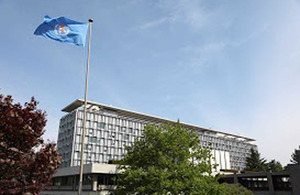Main Messages from WHA Seminar on Antibiotic Resistance
The UK delegation to the recent World Health Assembly in Geneva called for international action on the growing problem of fewer medicines to treat the soaring number of antibiotic-resistant infections.

Headquarters of the World Health Organisation in Geneva
At the Sixty sixth World Health Assembly, on 21 May 2013, Sweden and the United Kingdom organized, in collaboration with WHO, a side-event on the growing problem of antibiotic resistance. The Seminar was attended by more than 250 people from around 40 countries. It was opened by the Swedish Minister of Health Mr Göran Hägglund, together with Prof. Dame Sally C. Davies, UK Chief Medical Officer.
Professor Dame Sally Davies and Professor Otto Cars, Sweden, made introductory speeches to set the scene and make the case for urgent global action to tackle antibiotic resistance.
Dr. Keiji Fukuda, Assistent Director General for Health Security and Environment at WHO, likened antimicrobial resistance to a global health security emergency and briefly highlighted some of its implications for society.
Dr. Fukuda briefly outlined the work WHO is doing with partner organisations, such as FAO and OIE, and individual countries to address the issue. Senior officials from the Phillippines, India and Australia addressed what their countries are doing to counteract the growing problem of antibiotic resistance. This was followed by a question and answer session and a discussion moderated by Dr Fukuda.
Written contributions were made by a broad range of countries in Asia, Austria, Brazil, China, Germany, Malaysia and the Netherlands.
Main messages from the panelists:
Dr. Madeleine de Rosas Valera, Under Secretary, Department of Health, Philippines:
It is important to highlight that the misuse of antibiotics occurs not only in the treatment of humans but also in that of animals, and the need to improve the monitoring of the use of antibiotic in all relevent sectors.
Mr R.K. Jain, Additional Secretary, Ministry of Health & Family Welfare, India:
The sale and distribution of antibiotics, particularly third & fourth generation antibiotics, should be adequately regulated to ensure their rational use.
Professor Chris Baggoley, Chief Medical Officer, Australia:
A good health service standard together with surveillance, international engagement, communication between all levels and regulation of antibiotic use is vital.
Key messages from the event
Antibiotic resistance is a rapidly evolving health problem which extends far beyond the human health sector;
Awareness of the seriousness of the situation and the need for urgent action is required at the highest political level, as well as at a global and country level;
A cross sectoral approach - which includes health, agriculture, development, fishery, economics and other sectors - is needed at global and country level to develop national plans.
WHO leadership and technical support is crucial and the necessary resources must be allocated to tackle antimicrobial including antibiotic resistance. It was recognised that the WHO Global Task Force on Antimicrobial Resistance has a central role in coordinating collaboration and offering assistance to develop national and regional programs to tackle resistance.
Increased global cooperation and partnership is needed to:
- identify and promote incentives needed to develop effective business models for development of new theraputics, diagnostics and antibiotics, including ways to control the distribution, use and misuse of antibiotics
- promote “open reasearch”, where first stage research is shared for development of new tools, medicines and medical devices
- ensure all parts of society have access to high quality products and that their health is not compromised by sale of falsified, sub-standard or counterfeit medicine
Underpinning all this was the recognition of the need to reach out to clinicians, veterinarians, farmers, businesses and economists to encourage debate and find solutions.